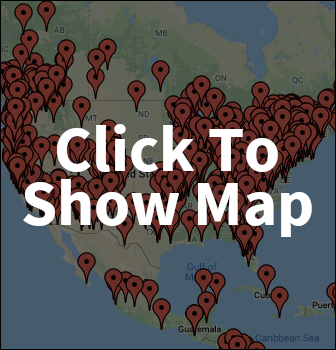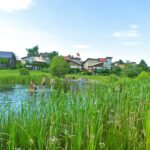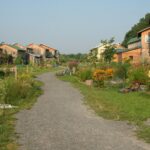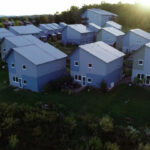EcoVillage at Ithaca
Ithaca, New York, United States
- Updated on: Jan 18, 2024 (about 1 year ago)
- Created on: Dec 31, 1999 (over 25 years ago)
Mission Statement
Our mission is to promote experiential learning about ways of meeting human needs for shelter, food, energy, livelihood and social connectedness that are aligned with the long-term health and viability of Earth and all its inhabitants.
Community Description
Located in the beautiful region of New York's Finger Lakes, EcoVillage at Ithaca has three thriving cohousing neighborhoods. The village features cooperative dining in the common houses, a swimming pond, neighborhood community gardens, hiking trails, play spaces, eighty-five energy efficient homes, a common house with 15 apartments, all in a multigenerational village-scale community.</p>
<p>The pedestrian village is surrounded by woods and open meadows. We have a 10-acre organic fruit and vegetable farm on site that provides produce for residents as well as the wider Ithaca area, and a 5-acre CSA berry farm that has delicious organic u-pick berries. We also host a 10 acre teaching farm, the Groundswell Incubator Farm, which offers support for beginning, low-income farmers.</p>
<p>Our goal is to build a replicable model of a cooperative, environmentally sensitive village that can also serve as a demonstration site for teaching principles of sustainability and permaculture.</p>
<p>Our nonprofit educational organization, THRIVE, is affiliated with the Center for Transformative Action at Cornell University. In addition to giving tours to over 500 visitors a year, our developing educational program provides hands-on training in community life, building sustainable communities, and green building techniques for building and planning professionals. We have helped to initiate and contribute to a sustainability movement in our locality that is bringing about profound changes in the region.</p>
<p>EcoVillage is located on 170 acres, two miles from downtown Ithaca, and three miles from Cornell University and Ithaca College. Ninety percent of the land is preserved as green space for organic agriculture and wildlife habitat. For more information about EVI, read Liz Walker's book, "EcoVillage at Ithaca: Pioneering a Sustainable Culture," New Society Publishers, 2005. It is available from our website.
- Status: Established (4+ adults, 2+ years)
- Started Planning: 1991
- Started Living Together: 1996
- Visitors Accepted: Yes
- Open to New Members: Yes
- Please read the details in Membership below before contacting this community.Send Message
- Website: http://www.ecovillageithaca.org
- Business, Project, or Organization: http://www.thriveithaca.org
- Facebook: https://www.facebook.com/EcoVillage-at-Ithaca-341917376090/?fref=ts
- Contact Name: EcoVillage at Ithaca
- Community Address:100 Rachel Carson Way
Ithaca, New York 14850
United States Location

About
- Type(s):
- Ecovillage (organized around ecology and sustainability)
- Cohousing (individual homes within group property)
- Programs & Activities:
- Volunteer, Internship, or Apprenticeship, or WWOOF’ing
- Neighborhood, Community Housing, or Homeowner's Association
- Organization, Resource, or Network
- Location: Suburban
Housing
- Status: We have land we have developed on
- Area: 170 acres
- Current Residence Types:
- Single-family homes
- Multi-family homes
- Condos
- Current Number of Residences: 103
- Housing Provided:
- Purchase
- Rental
- Land Owned By: Another form of Non-profit
- Additional Comments: EVI, Inc., the educational non-profit which started the project, owns most of the land. The Village Association, made up of residents owns the land surrounding the village.</p> <p>In the first two neighborhoods there are a total of 30 duplexes. All homes are attached.</p> <p>Second Neighborhood homes were completed in 2004. First Neighborhood in 1996. Third neighborhood was completed in November 2015. All homes in the third neighborhood (TREE) qualify for LEED Platinum, some are net zero energy, and some have qualified as Passivhaus.There are 4 duplexes, 15 apartments and 17 single family homes. </p> <p>Each neighborhood takes up 5-to-6 acres of land.
Membership
- Adult Members: 168
- Child Members: 40
- Non-Member Residents: 10
- Percent Women: 51-60%
- Percent Men: 41-49%
- Percent Transgender: 1-10%
- Percent Non-Binary: 1-10%
- Visitors Accepted: Yes
- Visitor Process: Please check our website for information at: https://ecovillageithaca.org/live/
- Open to New Members: Yes
- Membership Process: Those seriously interested in living at EVI should complete our educational process, which involves visiting us, participating in work and social events, reading Liz Walker's first book, studying our web site, and meeting with the Village Membership Committee. In this way, we assist people to self-select whether living at EVI will be a good fit for them.
- Additional Comments: We have a wide variety of spiritual traditions practiced.
Government
- Decision Making: Consensus + (everyone agrees, except for up to 3 people.)
- Identified Leader: No
- Leadership Core Group: No
- Additional Comments: The third neighborhood is using Sociocracy as a means of governance.
Economics
- Dues, Fees, or Shared Expenses: Yes
- Shared Income: None
- Required Weekly Labor Contribution: 2
- Open to Members with Existing Debt: Yes
- Additional Comments: Monthly costs include maintenance and upkeep of the property, exterior of all dwellings, and the three neighborhood common houses, plus real estate and school taxes, water, and capital reserve funds. Electricity is metered and billed accordingly. Other additional costs may include Internet access, land line phone service, the Social Justice Fund, and membership in the two non-profit organizations. There may, from time to time, be additional assessments, but these must be approved by the community.
Sustainability Practices
- Energy Infrastructure: We are connected to the grid.
- Current Renewable Energy Generation: 26-49%
- Energy Sources:
- Solar
- Clean Energy from the Grid
- Planned Renewable Energy Generation: Almost All, aroud 90%
- Current Food Produced: Between 26-49%
- Planned Food Produced: From 50-75%
- Food Produced Locally: From 50-75%
Lifestyle
- Common Facilities:
- Common House
- Garden(s)
- Library
- Workshop
- Swimming pond or pool
- Large Scale Kitchen
- Tractor & Farm Equipment
- Fire pit
- Swingsets & play areas
- Internet
- sauna
- Internet Available: Yes, community provides it
- Internet Fast?: Yes, exceptionally.
- Cellphone Service: Good for most people.
- Shared Meals: 2-5 times per week
- Dietary Practices:
- Omnivorous (plants and animals)
- Paleo (no grains, dairy, processed foods, or legumes)
- Local
- Organic (no pesticides or synthetic fertilizers)
- GMO Free (only non-genetically modified organisms)
- Mostly Vegetarian
- Mostly Vegan
- Dairy-Free
- Gluten-Free
- Tomato, grain, sugar free
- Dietary Choice or Restrictions: No - people may eat however they wish.
- Special Diets OK: Yes
- Alcohol Use: Yes, used occasionally.
- Tobacco Use: Yes, used seldomly, or ceremoniously.
- Additional Diet Comments: There are two Village-wide meals a week, plus one limited to each neighborhood, and at least two potluck meals. All are optional.</p> <p>lots of veggies, some fruits</p> <p>There are a wide range of individual dietary choices from omnivorous to vegan.</p> <p>Never in Common Houses but there is no policy against general use. However no members are tobacco users.
- Education Style(s):
- Home Schooling
- Private School off the property
- Public Schooling
- Up to each family or individual
- Healthcare Options: Up to each family, household, or individual
Cohousing
- Building Site Status: Completed
- Has a Shared Common Building: Yes
Additional Comments
We're on the edge of a small town. Our land includes farmland.
Community Network or Organization Affiliations
The Foundation for Intentional Community (FIC), Global Ecovillage Network (GEN), Coho/US, Ecovillage Network of the Americas
Fair Housing Laws
This community acknowledges that their listing does not include any potential violations of the Fair Housing Law, or that they do not provide housing. For any questions about this topic please see our Content Policies and contact FIC with any questions or concerns: directory@ic.org.
Keywords
ecovillage,cohousing,accessible,organic farm,educational programs,green building, sustainability
















